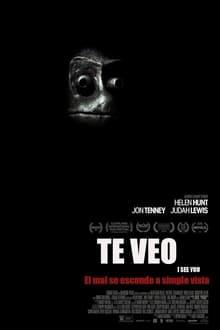
(Español / English)
Un ajedrez narrativo lleno de situaciones forzadas
Sumario
Es uno de esos típicos filmes basados en un concepto y en los giros narrativos y de género que conlleva. En este caso se trata del cambio del punto de vista. Pero el guion reduce a los personajes a meras piezas de un ajedrez narrativo y exhibe lagunas y situaciones forzadas e inverosímiles destinadas a mantener el interés del espectador pasada la primera sorpresa.
Reseña
La familia Harper vive en una enorme casa junto al mar. La madre, Jackie (Helen Hunt) es psicóloga, el padre, Greg (Jon Tenney) es policía. La relación entre ellos no anda nada bien y esto se refleja en la conducta de Connor, su hijo adolescente (Judah Lewis). Por otro lado, Greg toma a su cargo la investigación de la desaparición de un menor en un caso que recuerda a otros ocurridos 10 años atrás, cuyo culpable está preso. Pero en la casa comienzan a suceder inexplicables algunos sucesos inexplicables…
Todo esto parecería indicar el punto de partida de uno de esos buenos thrillers o películas de terror basados en un buen drama familiar. Pero lamentablemente no es así.
El de Adam Randall es de esos típicos filmes basados en un concepto y en los giros narrativos y de género que conlleva. En este caso se trata del cambio del punto de vista y la nueva información que eso suministra al espectador. Pero una buena idea no alcanza para hacer una buena película. En primer lugar, los personajes no se desarrollan y se convierten en meras piezas de la puesta en escena de un ajedrez narrativo. Pero el problema principal es que el guion presenta numerosos forzamientos, inverosimilitudes y lagunas (ver zona spoiler abajo) que malogran un planteo que era interesante, acaso con el objeto de sostener el impacto de la sorpresa que causa en el espectador.
De todos modos, la película (en definitiva más un thriller que una de terror), mientras va acumulando incoherencias, logra momentos de buen suspenso y luce una puesta en escena elegante, con una banda sonora por momentos efectiva para apuntalar la debilidad del relato.
A narrative chess full of forced situations
Summary
It is one of those typical films based on a concept and the narrative and genre twists that it entails. In this case it is about the change of point of view. But the script reduces the characters to mere pieces of a narrative chess and exhibits gaps and forced and unlikely situations designed to keep the viewer interested after the first surprise.
Review
The Harper family lives in a huge house by the sea. The mother, Jackie (Helen Hunt) is a psychologist, the father, Greg (Jon Tenney) is a policeman. The relationship between them is not going well at all and this is reflected in the behavior of Connor, his teenage son (Judah Lewis). On the other hand, Greg is in charge of investigating the disappearance of a minor in a case reminiscent of others that occurred 10 years ago, whose culprit is in prison. But some inexplicable events begin to happen in the house ...
All of this would seem to indicate the starting point of one of those good thrillers or horror movies based on a good family drama. But unfortunately it is not like that.
Adam Randall's is one of those typical films based on a concept and the narrative and genre twists that it entails. In this case it is about the change of point of view and the new information that this provides to the viewer. But a good idea is not enough to make a good movie. In the first place, the characters do not develop and become mere pieces in the staging of a narrative chess. But the main problem is that the script presents numerous forcings, implausibilities and loopholes (see spoiler area below) that spoil a proposal that was interesting, perhaps in order to sustain the impact of the surprise it causes on the viewer.
Anyway, the film (in short, more a thriller than a horror one), while accumulating inconsistencies, achieves moments of good suspense and shows an elegant staging, with an effective soundtrack at times to shore up the weakness of the story.